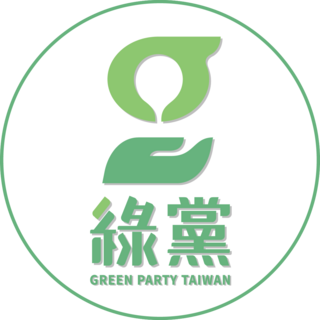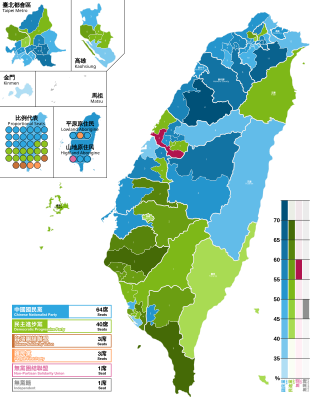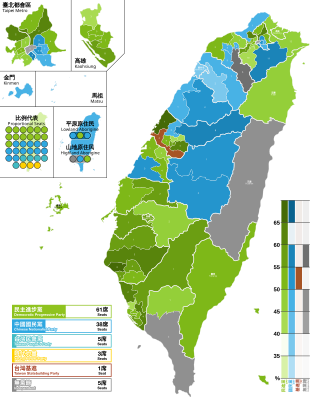
Taiwan, officially known as the Republic of China (ROC), is governed in a framework of a representative democratic republic under a five-power system first envisioned by Sun Yat-sen in 1906, whereby under the constitutional amendments, the President is head of state and the Premier is head of government, and of a multi-party system. Executive power is exercised by the Executive Yuan. Legislative power is vested primarily in the Legislative Yuan. The judiciary is independent of the executive and the legislature. In addition, the Examination Yuan is in charge of validating the qualification of civil servants, and the Control Yuan inspects, reviews, and audits the policies and operations of the government. The party system is currently dominated by two major parties: the Kuomintang (KMT), which broadly favors closer links to mainland China, and the Democratic Progressive Party (DPP), which broadly favors status quo and sovereignty.

Green Party Taiwan is a political party in Taiwan established on 25 January 1996. Although the party is sympathetic to Taiwanese nationalism and shares a number of centre-left positions with the Pan-Green Coalition, the party emphasizes campaigning primarily on social and environmental issues. The party is not a member of, and should not be confused with, the Pan-Green Coalition. Green Party Taiwan is a member of the Asia Pacific Greens Federation and participates in the Global Greens.

The Legislative Yuan is the unicameral legislature of the Republic of China (Taiwan) located in Taipei. The Legislative Yuan is composed of 113 members, who are directly elected for four-year terms by people of the Taiwan Area through a parallel voting system.
In Taiwan, parliamentary elections are held every four years to elect the 113 members of the Legislative Yuan, the unicameral legislature of Taiwan. The current electoral system was introduced in 2008. The constitutional amendments of 2005 extended term length from three to four years, reduced seat count from 225 to 113, and abolished the National Assembly, originally another governmental organ equivalent to a chamber of parliament.
There are eleven types of elections in Taiwan which, since 2012, have been unified into general and local elections, each held every four years, typically in January and November respectively. There may also be by-elections. Electoral systems include first-past-the-post, proportional representation, single non-transferable voting, and a parallel mixture of the above.

The President of the Legislative Yuan is the presiding officer of the Legislative Yuan of the Republic of China. The incumbent president is Han Kuo-yu, a legislator from the Kuomintang.

Legislative elections were held in Taiwan on 12 January 2008 to elect the members of the Legislative Yuan. It was the first Legislative Yuan election after the constitutional amendments of 2005, which extended term length from three to four years, reduced seat count from 225 to 113, and introduced the current electoral system.

The 2012 Taiwanese legislative election was held on 16 January 2012 for all 113 seats in the Legislative Yuan. For the first time, legislative elections were held simultaneously with the presidential election. Elected parliamentarians formed the fifteenth Legislative Yuan session since 1946, when the current constitution came into effect. Voting took place on 14 January 2012 between 08:00 and 16:00 local Taipei time at 14,806 polling stations nationwide.

The 8th Legislative Yuan was a term of members of the Legislative Yuan of Taiwan, from 1 February 2012 to 31 January 2016. Members were elected in the 14 January 2012 legislative election. The ruling Kuomintang (KMT) controlled the Legislative Yuan.

Taipei City Constituency I includes all of Beitou and part of Shilin in northern Taipei. The constituency is currently represented by Rosalia Wu of the Democratic Progressive Party.

Legislative elections were held in Taiwan on 16 January 2016 to elect all 113 members in the Legislative Yuan, alongside presidential elections. The Democratic Progressive Party (DPP) led by Tsai Ing-wen, who also won the presidential election on the same day, secured a majority for the first time in history by winning 68 seats. The ruling Kuomintang (KMT) lost both the presidency and its legislative majority and returned to the opposition.

The 9th Legislative Yuan was a term of members of the Legislative Yuan of Taiwan, from 1 February 2016 to 31 January 2020. Members were elected in the 16 January 2016 legislative election. The ruling Democratic Progressive Party control the Legislative Yuan for the first time. The next legislative election was held on January 11, 2020 for the Tenth Legislative Yuan.
New Taipei City Constituency I includes districts along the northwestern coast of New Taipei City. The district was formerly known as Taipei County Constituency I (2008–2010) and acquired its present boundaries since 2008, when all local constituencies of the Legislative Yuan were reorganized to become single-member districts.
New Taipei City Constituency II includes Wugu, Luzhou, and part of Sanchong in New Taipei City. The district was formerly known as Taipei County Constituency II (2008-2010) and acquired its present boundaries since 2008, when all local constituencies of the Legislative Yuan were reorganized to become single-member districts.
New Taipei City Constituency 5 includes all of Shulin, Yingge, and part of Xinzhuang in New Taipei City. The district was formerly known as Taipei County Constituency 5 (2008-2010) and was created in 2008, when all local constituencies of the Legislative Yuan were reorganized to become single-member districts.
New Taipei City Constituency 10 includes all of Tucheng and Sanxia in New Taipei City. The district was formerly known as Taipei County Constituency 10 (2008-2010) and was created in 2008, when all local constituencies of the Legislative Yuan were reorganized to become single-member districts.
New Taipei City Constituency XI includes districts in southeastern New Taipei City. The district was formerly known as Taipei County Constituency XI (2008-2010) and was created in 2008, when all local constituencies of the Legislative Yuan were reorganized to become single-member districts.
The Lowland Aborigine constituency is a multi-member constituency of the Legislative Yuan. Taiwanese indigenous people have elected representatives to reserved legislative seats since the 1970s. Predecessors to both the Lowland and Highland Aborigine districts were established in 1994. Since 2008 the Lowland Taiwanese indigenous elect three members to the Legislative Yuan. At its peak between 1998 and 2004, the constituency sent four members to the Legislative Yuan.
The Highland Aborigine constituency is a multi-member constituency of the Legislative Yuan. Taiwanese indigenous people have elected representatives to reserved legislative seats since the 1970s. Predecessors to both the Highland and Lowland Aborigine districts were established in 1994. Since 2008, the Highland Taiwanese indigenous elect three members to the Legislative Yuan.

Legislative elections were held in Taiwan on 11 January 2020 for all 113 seats to the Legislative Yuan concurrently with the 15th presidential election. The term of the Legislative Yuan began on 1 February 2020.
























